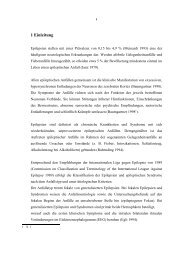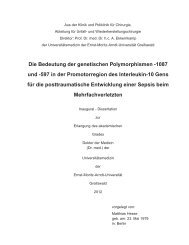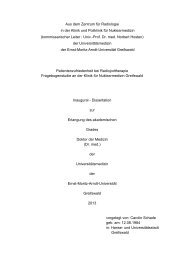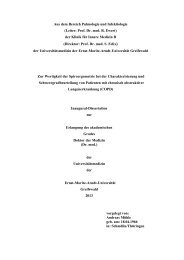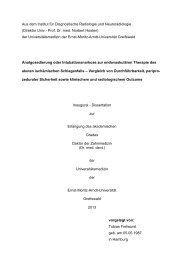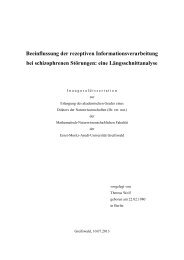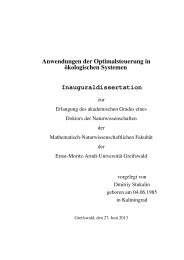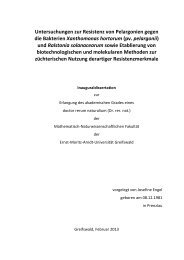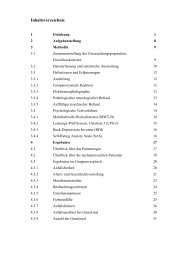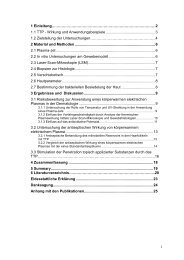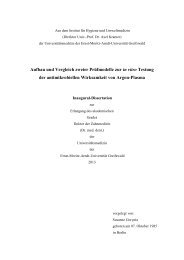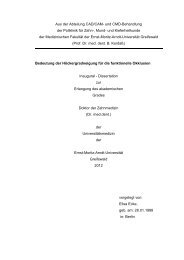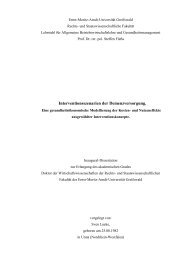Urban Green Areas – their functions under a changing lifestyle of ...
Urban Green Areas – their functions under a changing lifestyle of ...
Urban Green Areas – their functions under a changing lifestyle of ...
Create successful ePaper yourself
Turn your PDF publications into a flip-book with our unique Google optimized e-Paper software.
observe is activity <strong>of</strong> people. There are activities in working time and in leisure time. As the<br />
topic <strong>of</strong> this thesis introduced, leisure activities are focused on.<br />
The role <strong>of</strong> <strong>lifestyle</strong> for human activity refers to the role <strong>of</strong> a pretty active that <strong>lifestyle</strong><br />
reflects the progress <strong>of</strong> society. This effect can be shown in that it promotes social<br />
development in the direction <strong>of</strong> progress. The initiative to build good <strong>lifestyle</strong>s for residents<br />
<strong>of</strong> a society is to create the driving force for human development. This can be absorbed<br />
from education as well as from other social forces. Therefore, to better <strong>under</strong>stand these it<br />
is necessary to have a closer look at leisure activities and <strong>their</strong> determining factors.<br />
3.2.5.1 Concept <strong>of</strong> leisure<br />
The concept <strong>of</strong> leisure is seen as the socially acceptable antithesis <strong>of</strong> the concept <strong>of</strong> work.<br />
Researchers have studied working conditions and labor resources since the times <strong>of</strong> ancient<br />
Greece. Then later, they recognized that there remained the non-working time.<br />
Most researchers “have tended to explain leisure as the antithesis <strong>of</strong> work” (VOSS<br />
1967: 91). For the original purpose <strong>of</strong> analyzing economic data it is necessary to define the<br />
work-leisure relationship.<br />
The word ‘leisure’ can be used to refer to leisure time, leisure activities or the state <strong>of</strong> mind<br />
<strong>of</strong> being at leisure. It is usually the activities (or the equipment needed to take part) that are<br />
being marketed. However, as the activity takes place in ‘leisure time’ and provides the<br />
participant with a ‘leisure experience’, it is important to <strong>under</strong>stand what distinguishes<br />
these from other kinds <strong>of</strong> time and experiences (MORGAN 1996: 2-3).<br />
The three terms: leisure time, spare time and free time are synonyms. Hence, this review<br />
includes most <strong>of</strong> the important ideas <strong>of</strong> time related to leisure.<br />
3.2.5.2 Features <strong>of</strong> Leisure activities<br />
Leisure time occurs, and leisure activities take place, when we are free not only from the<br />
necessities <strong>of</strong> work, but also from the obligations <strong>of</strong> family and social duties (MORGAN<br />
1996: 21). It is not however always obvious whether an activity is leisure or obligate.<br />
Figure 3.4 shows three different, but overlapping time categories.<br />
Time budget <strong>of</strong> an individual is constant within the daily unit <strong>of</strong> twenty four hours.<br />
<br />
<br />
<br />
Working time is time an employee works for his/ her income.<br />
Time for obligating tasks includes time for domestic activities (sleeping, eating,<br />
drinking, etc.) and tasks as position in <strong>their</strong> own family and community (such as:<br />
house works, taking care <strong>their</strong> children, and social tasks).<br />
The time left is leisure time or spare time, in which one can decide what one wants<br />
to do.<br />
66



